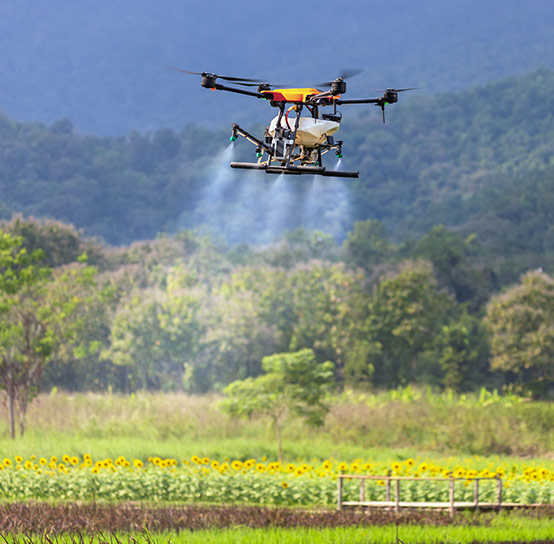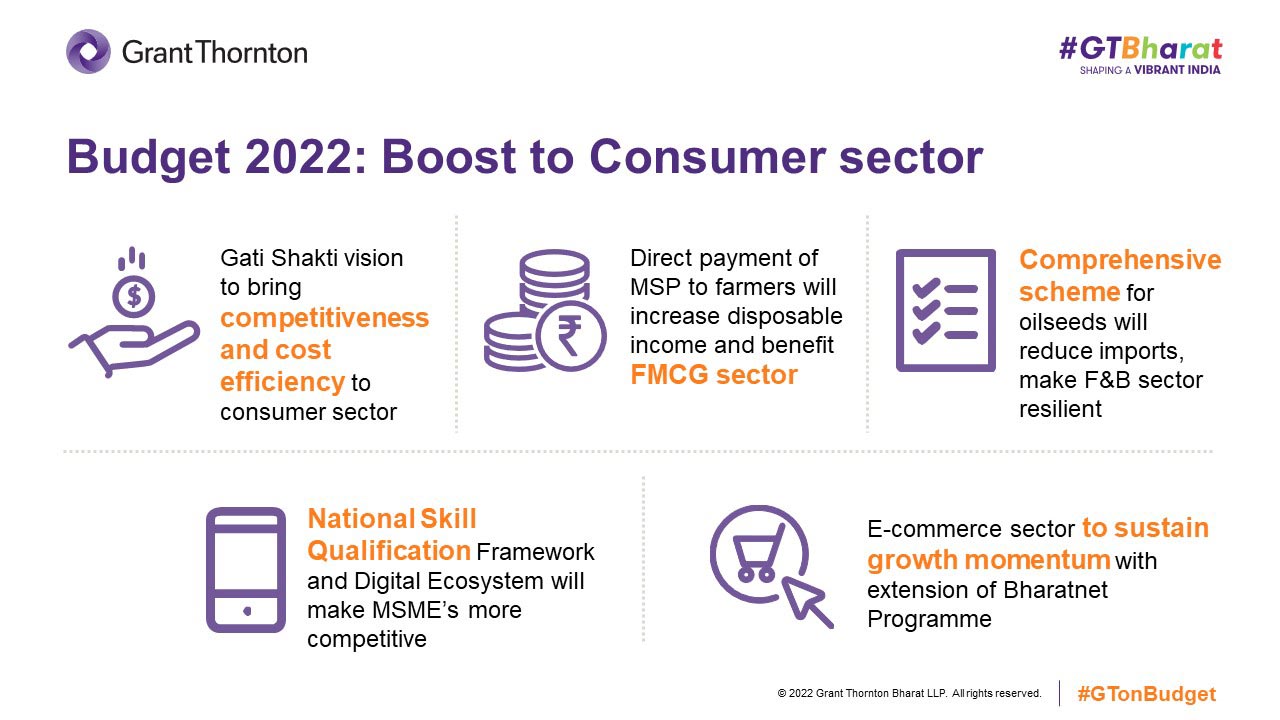-
Business Consulting
Our business consulting specialists offer a comprehensive blend of strategic advisory services. We assess the business, industry, operating model, synergy, skill sets and vision of the organisation and recommend the way forward
-
Digital Transformation Services
Grant Thornton’s digital transformation services help traditional businesses digitalise their business models with cloud technology, IoT consulting, app development and more DigiTech solutions.
-
Human Capital Consulting
Our Human Capital Consulting team harnesses technology and industry expertise to assist in constructing adaptable organisations with transparency, fostering productive and value-driven workforces, and inspiring employees to engage meaningfully in their tasks.
-
Production Linked Incentive Scheme
Production-linked Incentive Scheme by the Indian government is aimed at boosting manufacturing. Grant Thornton Bharat offers varied services across sectors to help businesses avail of this scheme.
-
Public Sector Advisory
Our Public Sector Advisory team has focused streams, aligned with the core priorities of the Government of India. We are responsible for providing innovative and customized technical and managerial solutions.
-
Tech Advisory
We have amalgamated Digital Transformation, IT Advisory & Information Management and Analytics into a new offering, DigiTech.
-
Direct Tax services
Our tax specialists offer a comprehensive blend of tax advisory, tax litigation, regulatory and compliance services, helping you navigate through complex business matters.
-
Indirect Tax Services
Get tax advisory service by leading tax firm Grant Thornton India. Our indirect tax services include advisory, compliance and litigation services for corporate, international and transaction tax
-
Transfer pricing services
Our transfer pricing services experts provide a range of services from provision of APA services to handling large global assignments including Country by Country reporting.
-
US Tax
At Grant Thornton, we help individuals and dynamic companies deal with US tax laws, which are one of the most complicated tax legislations across the world.
-
Financial Services - Tax
Best financial advisory services, tailored for small and large businesses by the experts having comprehensive knowledge of domestic laws and access to multifaceted tools to provide a valuable results.
-
Financial Reporting consulting services
Our experts have significant hands-on experience in providing IFRS/US GAAP services, end-to-end solutions and support services to fulfil financial reporting requirements.
-
Fund accounting and financial reporting
International operations often lack standardisation and have varied local reporting formats and requirements. Our experts can offer proactive insights, practical guidance, and positive progress and help meet regulatory timeframes.
-
Compliance and Secretarial Services
Our experts can assist in overhauling the entire compliance machinery of the organisation through evaluation of the applicable statutory obligations, monitoring of adequate governance controls, reporting and providing ongoing support.
-
Global People Solutions
As businesses transcend borders, both domestic and global considerations need equal attention. Our interim CFO and financial controller support services help organisations meet the business vision.
-
Finance and accounting outsourcing
Our accounting experts assist organisations in managing their accounting and reporting. Our dedicated Integrated Knowledge and Capability Centre (IKCC), allows us to service both the domestic and global markets efficiently and cost-effectively
-
Compliance Management System
We have automation solutions for you that will allow meeting government requirements and remain diligent, which when failed, can lead to penalties and loss in revenue.
-
IKCC: Grant Thornton's Shared Service Centre
The India Knowledge and Capability Centre (IKCC), aimed at delivering solutions by developing capabilities, has completed four years of its journey.
-
Global compliance and reporting solutions
At Grant Thornton Bharat, we meet the challenges of our clients and help them unlock their potential for growth. Our professionals offer solutions tailored to meet our clients’ global accounting and statutory reporting requirements. With first-hand experience of local reporting requirements in more than 145+ locations worldwide, we provide seamless and consistent international service delivery through a single point of contact.
-
Related Party Transactions Governance
Grant Thornton Bharat's comprehensive related-party transaction services ensure good governance by adhering to regulatory requirements, promoting transparency, and providing robust policies for compliance, documentation, and accountability in related-party transactions.
-
Private Client Services
Grant Thornton Bharat Private Client Services offers tailored advisory for family-owned businesses, focusing on governance, compliance, tax, succession planning, and family office structuring to sustain wealth and preserve legacies across generations.
-
GTMitra: Tax & Regulatory Tool
GTMitra, a specialised tax and regulatory tool by Grant Thornton Bharat, supports multinational businesses in understanding laws and regulations for effective growth strategies.
-
Labour codes
Labour codes solutions help you transition through the new legislation. At Grant Thornton, we help businesses divide their approach to make sure a smooth transition.
-
Alerts
At Grant Thornton India, with the help of our tax alerts, we help to provide updates on how to minimise your tax exposure and risks.

-
Cyber
In today’s time, businesses have gone through large transformation initiatives such as adoption of digital technologies, transition to cloud, use of advanced technologies et al.
-
Governance, Risk & Operations
Our Governance, Risk and Operations (GRO) services encompass Internal Audit, Enterprise Risk Management, Internal Financial Controls, IT advisory, Standard Operating Procedures and other services.
-
Risk analytics
Grant Thornton Bharat’s CLEARR Insights is a state-of-the art data analytics platform that will help you in seamless data analysis and efficient decision-making.
-
Forensic & Investigation Services
The team of forensic advisory services experts consists of the best intelligence corporate experts, and fraud risk, computer forensic experts to deliver most effective solutions to dynamic Indian businesses.
-
ESG consulting
Grant Thornton Bharat offers holistic ESG consulting solutions for sustainable business outcomes. With industry expertise and AI technology, we drive long-term value.

-
Transaction Tax Services
Our transaction tax experts understand your business, anticipate your needs and come up with robust tax solutions that help you achieve business objectives ensuring compliance and efficiency
-
Deal Advisory
Unlike other M&A advisory firm in India, we offer deal advisory services and work exclusively with controlled and well-designed strategies to help businesses grow, expand and create value.
-
Due Diligence
Grant Thornton’s financial due diligence services are aimed at corporate looking for mergers and acquisitions, private equity firms evaluating investments and businesses/promoters considering sale/divestment.
-
Valuations
As one of the leading valuation consultants in India, Grant Thornton specializes in all the aspects of the process like business valuation services, financial reporting, tax issues, etc.
-
Overseas Listing
Overseas listing presents a perfect platform for mid-sized Indian companies with global ambitions. Grant Thornton’s team of experts in listings, work closely with clients during all stages.
-
Debt & Special Situations Solutions
Grant Thornton Bharat offers specialist debt and special situations consulting services, including restructuring, insolvency, and asset tracing solutions.
-
Financial Reporting Advisory Services
Grant Thornton Bharat Financial Reporting Advisory Services offer end-to-end solutions for complex financial requirements, including GAAP conversions, IPO support, and hedge accounting advisory, ensuring accurate financial reporting and compliance.
-
Financial Statement Audit and Attestation Services
Grant Thornton Bharat offers customised financial statement audit and attestation services, ensuring impeccable quality and compliance with global standards. Our partner-led approach, technical expertise, and market credibility ensure effective solutions for your business needs.

- Agriculture
- Asset management
- Automotive and EV
- Aviation
- Banking
- Education and ed-tech
- Energy & Renewables
- Engineering & industrial products
- FinTech
- FMCG & consumer goods
- Food processing
- Gaming
- Healthcare
- Urban infrastructure
- Insurance
- Media
- Medical devices
- Metals & Mining
- NBFC
- Pharma, bio tech & life sciences
- Real estate and REITs
- Retail & E-commerce
- Specialty chemicals
- Sports
- Technology
- Telecom
- Transportation & logistics
- Tourism & hospitality
-
 Media article Union Budget 2024 expectations: Building resilience for consumer industryUnion Budget 2024 expectations: Building resilience for consumer industry
Media article Union Budget 2024 expectations: Building resilience for consumer industryUnion Budget 2024 expectations: Building resilience for consumer industry -
 Report Grain to gain: Impact of corn on India’s biofuel revolutionExplore Grant Thornton insights on unlocking India’s Energy Potential on Corn-Based Ethanol as a sustainable fuel solution.
Report Grain to gain: Impact of corn on India’s biofuel revolutionExplore Grant Thornton insights on unlocking India’s Energy Potential on Corn-Based Ethanol as a sustainable fuel solution. -
 Case study Transforming agriculture: The rise of Drone DidisDiscover how Grant Thornton Bharat's Drone Didis initiative empowers rural women and transforms agriculture with drone technology. Learn more about this success.
Case study Transforming agriculture: The rise of Drone DidisDiscover how Grant Thornton Bharat's Drone Didis initiative empowers rural women and transforms agriculture with drone technology. Learn more about this success. -
 Podcast Expect food prices to rise due to the heat: Grant Thornton’s Rishi ShahExplore how rising heat is affecting food prices in the podcast with Rishi Shah from Grant Thornton Bharat. Insights on economic trends and inflation.
Podcast Expect food prices to rise due to the heat: Grant Thornton’s Rishi ShahExplore how rising heat is affecting food prices in the podcast with Rishi Shah from Grant Thornton Bharat. Insights on economic trends and inflation.
-
India-UK
India-UK

One thing is certain that the budget presented by the Finance Minister is forward-looking. With some focus on short-term initiatives, the tabled budget is expected to provide an impetus for growth with a vision to steer the economy for the next 25 years. The announcements made are in line with ‘Amrit Kaal', i.e., focus of India@100, which is primarily around making long-term investments in the economy that will benefit the youth, women and farmers. Furthermore, the new generation is likely to be the base that will drive the Prime Minister's vision of a $5 trillion economy and the government is strengthening this base to drive the agenda.
Here are five announcements that will fuel the consumer sector.
Support via Gati Shakti
The Prime Minister's Gati Shakti vision of transforming the logistics space will be quite beneficial for the consumer, retail and the e-commerce sector. The sector always faced a challenge due to high logistics cost and inefficient supply chains, which resulted in higher operating cost for the sector. As compared to a global average of 8%, India's logistics cost is at 14% of GDP. The budget paves the way for expansion of highway network, initiation of Unified Logistics Interface programme, multimodal logistics park as well as usage of railways system. Its efficient utilisation will definitely help in bringing more competitiveness and cost efficiency in the consumer sector. As per Grant Thornton Bharat's survey, 32% respondents wanted the government to enhance logistics and supply-chain efficiency.
Direct payment of MSP to farmers
The announcement of direct payment of Minimum Support Prices (MSP) into the farmers' accounts will improve their effective earnings and add more muscle to the rural consumption. This will also lead to an increase in disposable income at the hands of the farmers, which will be beneficial since rural markets account for 40% of the total fast-moving consumer goods (FMCG) market in India.

Comprehensive Scheme for oilseeds
India is one of the largest importers of vegetable oil and the import cost is creating a pressure on the all the food and beverage (F&B) companies in India. The Finance Minister's move to launch a comprehensive scheme for increasing the domestic production of oilseeds is a welcome move and will result in reduced dependence on imports, thus, making the F&B sector more resilient.
Extension of ECLGS scheme
India's MSME sector contributes to 29% of the India's GDP. The pandemic created a lot of stress on the overall functioning of the sector. Extension of Emergency Credit Line Guarantee Scheme (ECLGS) will further strengthen the ecosystem for them. The ₹ 50,000 crore extension given to MSME's functioning in the hospitality and related services will help the sector to tide over the effects of the pandemic. Initiatives, such as National Skill Qualification Framework and Digital Ecosystem for skilling and livelihood, will help in making MSME's more competitive. This is also in line with Grant Thornton Bharat's survey wherein 54% respondents wanted more support on the skilling front.
Extension of Bharatnet Programme
The government announcement on extension of Bharatnet Programme under public-private partnership (PPP) model in rural areas will ensure higher internet connectivity further providing villages and rural areas with better access to digital initiatives. With the right infrastructure and an increasing volume of smart phone shipments in India (11% YoY increase in 2021) will definitely help the e-commerce sector to sustain growth momentum.
From all the initiatives announced, the government is definitely continuing with its agenda of ‘minimum government and maximum governance'. Reduction in compliance (25,000 provisions) and repealment of redundant laws (1,486 union laws scrapped) go a long way in establishing intent of ease of doing business. On an overall basis, the implementation of these initiatives will help the consumer and retail sector in achieving its growth initiatives.
This article was originally published on NDTV.
